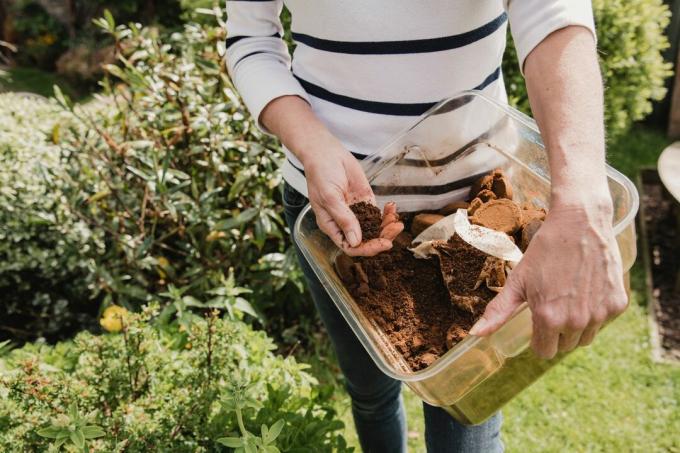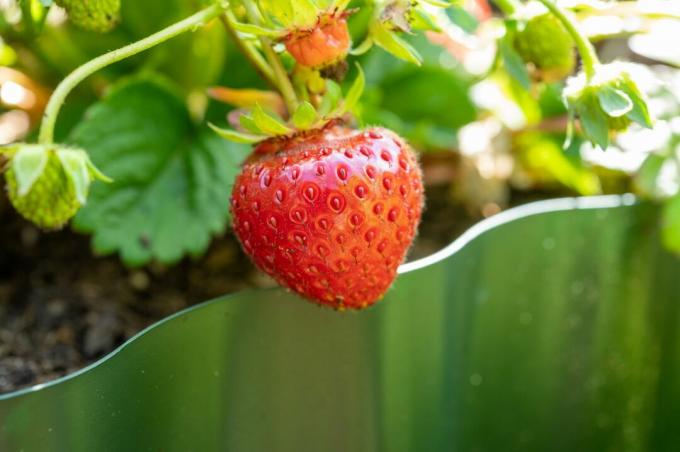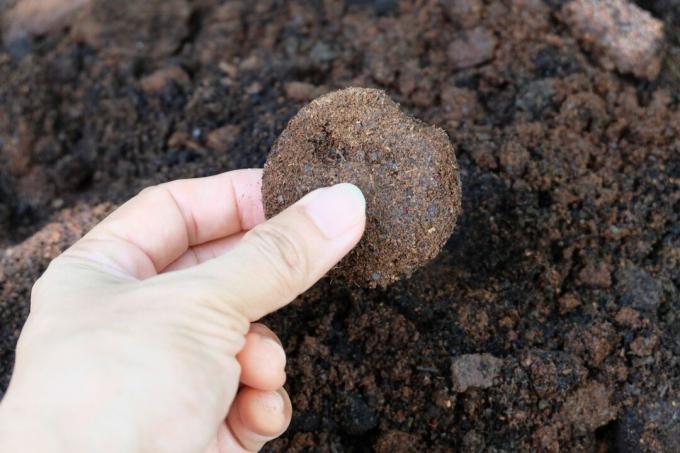Many of us have already experienced the effects of caffeine on the human organism. Snails also react to the neurotoxin. Can this effect be used, does coffee grounds help against snails in the garden?

Coffee grounds, consisting of ground coffee beans, are a by-product of making coffee. It contains around 2% nitrogen, 0.8% potassium and 0.4% phosphorus, which are important plant nutrients, as well as tannic acids, antioxidants and caffeine. Therefore, one or the other has certainly already encountered it as a fertilizer. In addition, earthworms are attracted by coffee grounds in the ground, which loosen the soil. Ants and cats, on the other hand, are kept away from the bed. You will find out below whether this also applies to snails.

Does coffee grounds help against snails?
First of all, a distinction should be made between different applications. On the one hand you can sprinkle coffee grounds against snails, on the other hand you can spray plants with cold coffee or coffee grounds extracts. When used correctly, coffee and coffee grounds can help against snails - but they also have side effects. We will look at these in the next chapter. The caffeine contained in coffee literally annoys snails - after all, it is a neurotoxin.
Dry coffee grounds against snails: As pure coffee grounds, it is only a deterrent and does not work entirely reliably because the concentration of caffeine in the coffee grounds is not high enough. If nudibranchs have a particularly big appetite, the coffee grounds can hardly stop them.
Cold coffee or coffee extracts against snails: As part of research at the University of Nebraska, the substrate or leaves of plants were sprayed with caffeine solutions of various concentrations. It was found that snails with a caffeine content of more than 0.1% are deterred and that with a caffeine content of 1% or more, they are sometimes even killed. The caffeine content varies in different coffee beans. Arabica coffee has a content of 0.8 to 1.4%, Robusta coffee has a content of 1.7 to 4%. However, brewed coffee has a lower caffeine content of around 0.06 to 0.1%. So if you want to make a more concentrated caffeine solution like in the experiment mentioned above, you have to make a very strong coffee. However, the high concentration of caffeine can also damage other living things in the garden, as you will learn below.
tip: What you should know about both methods: Caffeine, which is responsible for the effect, is water-soluble. That means, when it rains it is washed away.

How does coffee work against snails?
Physiological studies on mollusc neurons suggest that caffeine releases calcium from their internal stores, thereby increasing the duration of the action potential. The action potential serves to transmit stimuli. If it is increased for longer than usual, in addition to increased oxygen and energy consumption, there are other reactions in the body that can ultimately lead to collapse. However, when a snail crawls across soil mixed with coffee grounds, it is unlikely that it will take in enough caffeine to die of it.
Other studies suggest that certain ingredients in coffee grounds are the Stimulate mucus production and deter the snails, as they thus lead to increased water loss would have feared.
It is also assumed that the smell of coffee alone scares off the snails, as they have a sensitive sense of smell and the smell of coffee does not appeal to them very much.
Important: Caffeine has a highly concentrated, undirected, harmful effect on most living things.
On the one hand, the neurotoxin caffeine also has a fatal or at least a deterrent effect on beneficial organisms such as snails, earthworms and insects. On the other hand, according to a study, damage to the plant can occur at high concentrations.

Use coffee grounds against snails in the garden
In the private garden, dried coffee grounds are used against snails. Coffee powder can also be used, it even has a higher caffeine content. However, it is questionable whether an expensive and resource-intensive stimulant like coffee should really be scattered around the garden.
We recommend spreading coffee grounds around susceptible plants. The intense smell prevents the snails from crossing such a broad barrier. The ring should only be renewed once in the course of the year in order not to damage the soil life from the caffeine.

Undiluted cold coffee can be poured onto the soil near the plants. Most plants can also handle being sprayed directly with cold coffee. However, flowering plants should be excluded, as the coffee not only scares off snails but also pollinators.
So that the coffee is not washed away by the rain, it is advisable to keep an eye on the weather. Therefore, do not spray the plants if a shower is already raining down on them afterwards. Since the application is still relatively new and unexplored, there are unfortunately no precise statements as to which plants and in which form could be affected by leaf damage from coffee. The motto here is therefore: try it yourself.
Conclusion: Unfortunately, coffee grounds do not work reliably against snails and can affect beneficial insects in your garden. If the snail population in the garden is too large, this is not a solution.
For effective prevention and control of snails in the garden, we recommend our corresponding article "Fighting snails" to read. There you will find numerous tips, such as the use of slug pellets.

Slug pellets versus slugs
If you are not a coffee drinker, do not want to harm beneficial organisms with caffeine or do more than just one, Has two snails in the bed, of course, looks around for alternatives and finds them at Slug pellets. This remedy is effective when it comes to eliminating snails in the garden. Because conventional grain made from metaldehyde harms children, mammals and other living things can lead, we at Plantura have a less dangerous alternative that is gentle on beneficial organisms developed. Our Plantura organic slug pellets consists of iron-III-phosphate and allows the snails to retreat into their hiding places after consumption without the formation of slime and to excrete there. You can find out how to use it correctly in our article on slug pellets.
In addition to various remedies that are available against snails, you can also rely on the support of certain plants. You can find out which these are in our articles "Snail-resistant plants" and "Plants against snails“Read.



